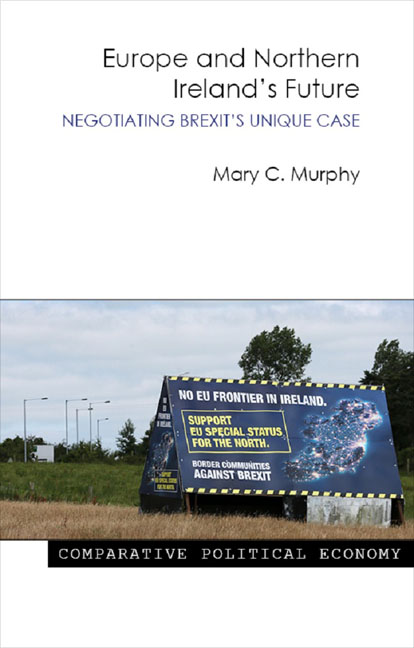Book contents
- Frontmatter
- Dedication
- Contents
- Acknowledgements
- Foreword
- Abbreviations
- 1 The political economy of a pressured relationship
- 2 The politicization of Brexit in Northern Ireland
- 3 When introverted politics and political economy collide
- 4 Who speaks for Northern Ireland?
- 5 Europe and Northern Ireland’s future
- References
- Index
Foreword
Published online by Cambridge University Press: 16 August 2023
- Frontmatter
- Dedication
- Contents
- Acknowledgements
- Foreword
- Abbreviations
- 1 The political economy of a pressured relationship
- 2 The politicization of Brexit in Northern Ireland
- 3 When introverted politics and political economy collide
- 4 Who speaks for Northern Ireland?
- 5 Europe and Northern Ireland’s future
- References
- Index
Summary
The lesson that we learned from Britain’s 2016 referendum on the European Union is that European integration is experienced differently in different places. This is obviously true across countries, and always has been the case. The British referendum revealed the extent to which such distinctiveness is also true within member states. The British vote was surprising because of the concentration of support for membership in the European Union in places like London, Oxford and Cambridge. It was also surprising for the concentration of desire to leave the European Union in many parts of Britain outside of those major cities. There were of course important exceptions. Scotland and Northern Ireland were most prominent among these. And, in the immediate aftermath of the vote, there was considerable concern that Scots might take advantage of the difference in attitudes to push for another referendum on independence. That seemed to be the most potent source of division within the United Kingdom.
What few observers recognized at the outset, however, were the full implications of the Northern Irish case. To say that Northern Ireland’s relationship with European integration is “distinctive” is an understatement. The Northern Irish peace process was framed by European Union membership both for Ireland and for the United Kingdom. In the two decades that followed the Good Friday Agreement, the people of Northern Ireland grew accustomed to being able to interact freely both with the British and with the Irish economy thanks to this European Union membership.
The decision of the British people to leave the European Union threatened much of this new freedom. In doing so, and inadvertently, that decision also threatened the post-conflict stabilization of Northern Ireland. This potential disruption was difficult to appreciate for any but the closest observers of Northern Irish politics. Even within the British government, the distinctive position of Northern Ireland relative to European Union membership was under-explored. This became all the more true in the aftermath of the May 2017 British general election.
- Type
- Chapter
- Information
- Europe and Northern Ireland's FutureNegotiating Brexit's Unique Case, pp. ix - xiiPublisher: Agenda PublishingPrint publication year: 2018

